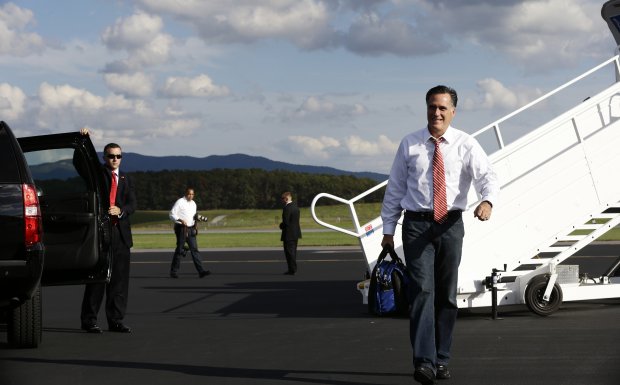Libya Scandal Provides Big Opening for Romney
By Byron York
WashingtonExaminer.com

Mitt Romney will give what's billed as a major foreign policy speech Monday at the Virginia Military Institute. In the words of his campaign, Romney plans to "offer a stark contrast between his vision for a strong foreign policy and the failed record of President Obama." Romney will pay special attention to the Middle East, where he sees crises in Syria, Egypt, Iran and elsewhere.
One open question is what Romney will say about a crisis that is threatening to turn into a full-scale scandal for the Obama administration. In the more than three weeks since Ambassador Chris Stevens and three other Americans were killed in a terrorist attack on the U.S. consulate in Benghazi, Libya, developments there have revealed administration actions that demand serious investigation from Congress -- and, eventually, serious comment from the Republican nominee.
In the last few weeks, the public has learned that high-ranking U.S. officials 1) ignored repeated attacks and threats directed at westerners and American facilities in Libya; 2) denied urgent requests from U.S. diplomats for increased security; 3) spread a false story blaming the Sept. 11 attack on an anti-Muslim Internet video; and 4) claimed to have begun an "investigation" that so far has been cursory at best.
Damaging revelations keep piling up. A few days ago, for example, reporters from the Washington Post visited the burned-out consulate in Benghazi and came across sensitive U.S. government documents. What they found was interesting, but the fact that they found the documents at all was astonishing. After saying for weeks that the area was too dangerous, FBI agents finally reached Benghazi on Thursday, long after journalists, looters and curiosity seekers had combed the site.
Besides a few press reports, most of what the public has learned recently has come from Republicans in the House, where oversight committee Chairman Darrell Issa and national security subcommittee Chairman Jason Chaffetz have gathered information from government whistleblowers concerned about events in Libya.
This week, Issa and Chaffetz summarized their findings in a letter to Secretary of State Hillary Clinton. The violence that killed Ambassador Stevens was just "the latest in a long line of attacks" in recent months, they wrote. "It was clearly never, as administration officials once insisted, the result of a popular protest. In addition, multiple U.S. federal government officials have confirmed to the committee that, prior to the September 11 attack, the U.S. mission in Libya made repeated requests for increased security in Benghazi. The mission in Libya, however, was denied these resources by officials in Washington."
Issa and Chaffetz have scheduled a hearing next Wednesday to explore still more new information and question administration officials. If the two lawmakers weren't on the case, it's likely the public would know next to nothing about what went on.
That's in part because the administration is stonewalling the press. This week, when ABC's Jake Tapper asked White House spokesman Jay Carney about the House revelations, Carney told Tapper to ask the State Department. When Tapper protested that the State Department was refusing to comment, Carney essentially shrugged his shoulders.
In recent days, Romney's statements about Libya have been limited to brief mentions within wide-ranging remarks about the Middle East. His recent op-ed in the Wall Street Journal, for example, offered a broad overview of the region, lumping together the problems in Libya with Syria, Egypt and Iran.
What sets Libya apart from the others, and demands special attention from Romney, is that it likely involves not just misguided policies but actual misconduct on the part of the administration. Romney could position himself at the forefront of those demanding a rigorous, full and transparent investigation.
So far, though, some Republicans are unhappy with Romney's handling of the Libyan issue. The way it looks to them, Romney jumped on the story when he released a statement the night of the 9/11 attack. But Romney ran into a storm of criticism, mostly in the mainstream press but also from some Republicans, for allegedly "politicizing" the incident. After that, Romney backed off. Since then, the revelations about Libya have become more and more disturbing.
Privately, Romney advisers suggest the Libyan story is moving forward without any pushing from the Republican candidate. They also maintain that Romney hasn't ignored the issue. "He has talked about it," close aide Eric Fehrnstrom said shortly before Wednesday night's debate in Denver. "We're going to have a foreign policy debate later this month. There will be a foreign policy speech as well."
Perhaps those events will give Romney the chance to raise serious questions about specific Obama administration actions in Libya. He'll certainly need to do it somewhere, soon.
Byron York, The Examiner's chief political correspondent, can be contacted at byork@washingtonexaminer.com. His column appears on Tuesday and Friday, and his stories and blog posts appear on washingtonexaminer.com.

